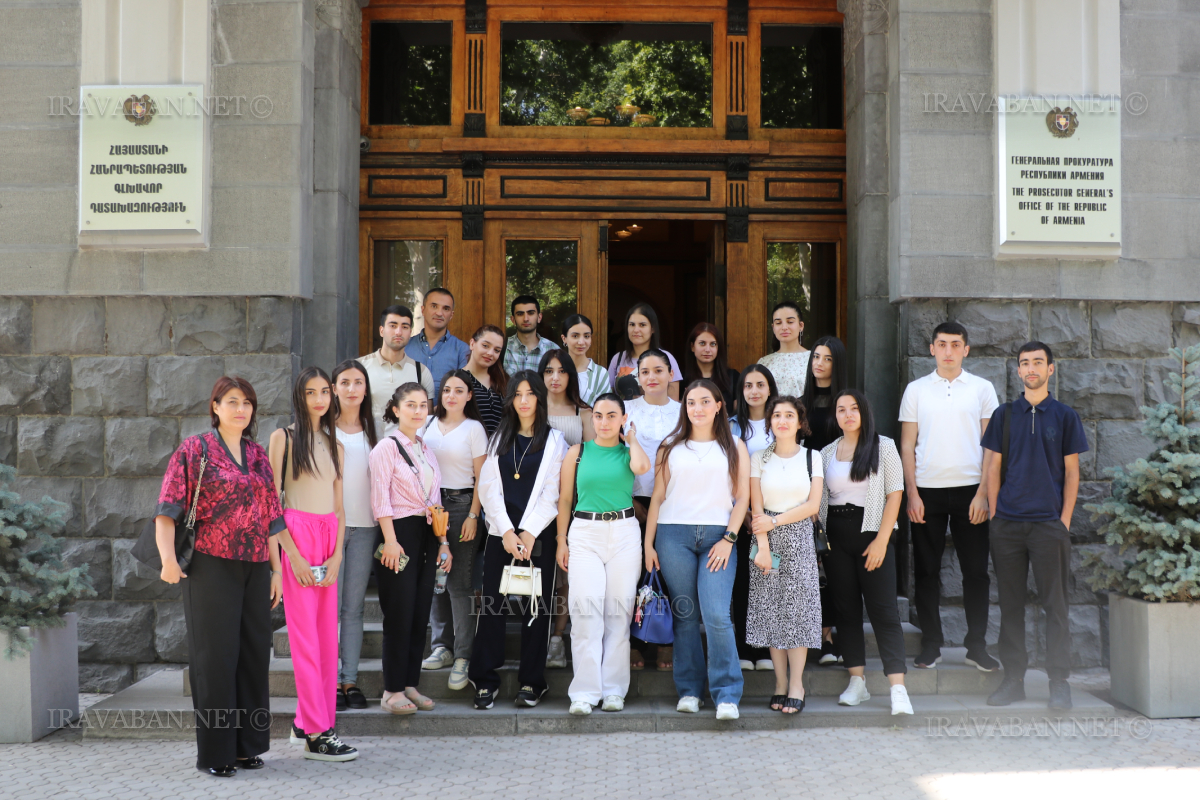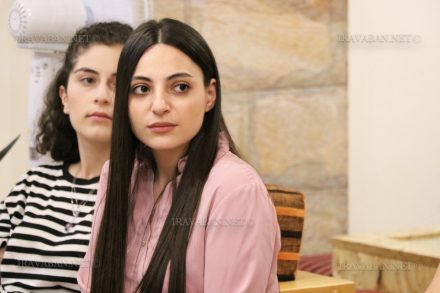Offshore Zones, Damage caused to the State, Confiscation of Property of Illicit Origin: Students of the Anti-Corruption School for Young Leaders visited the Prosecutor General’s Office

On 14 July, the students of the 9th stream of the Anti-Corruption School for Young Leaders, the 1st anti-corruption professional educational initiative operating in the Republic of Armenia, were hosted by the Prosecutor General’s Office of the Republic of Armenia within the framework of the master classes and practical skills development phase of the 9th stream of the school.
Edgar Arsenyan, Acting Head of the Department of Supervision over Legality of Pre-trial Proceedings in the RA Anti-Corruption Committee of the Prosecutor General’s Office of the Republic of Armenia recieved the students.
He presented to the school students the role of the Prosecutor General’s Office in the fight against corruption, the priorities and the problems that the body is facing. Edgar Arsenyan separately emphasized the work done by the Anti-Corruption Committee in this direction.
“The Anti-Corruption Committee is unique in its structure, as it is the only investigative body that also has a division that carries out operative-investigative activities. It is true that it has been operating for 1-1.5 years, but it is already recording quite good results. The Committee also has a frequency in connection with eavesdropping on individuals,” he said.
One of the new and key units created in the Prosecutor’s Office is the Department for Confiscation of Property of Illicit Origin. Edgar Arsenya emphasized that confiscation of property in corruption cases and recovery of damage caused to the state is the most important and expected result within these proceedings.
“A person can be sentenced to 10 years in prison, but the damage caused by him to the state, millions of dollars, will remain in the air. That is why one of our important directions is to take measures so that we can restore the damage caused,” he said.
Gayane Tadevosyan, one of the students of the school, was interested in what measures the Prosecutor’s Office is taking to return assets found in offshore zones. “We know that a significant part of properties and assets of illicit origin are also stored in offshore zones.”
offshore zones. “We know that a significant part of properties and assets of illicit origin are also stored in offshore zones.”
The representative of the Prosecutor’s Office mentioned that the matter is one of the biggest problems of the Prosecutor’s Office in criminal proceedings. In this case, the body applies to X country, where the property is located, through the mediation of appropriate mutual legal assistance. There are relevant conventions for the CIS, Europe and other regions.
“We appeal and ask for their support in confiscating the property. For example, in the case of one of the famous former high-ranking officials, the USA imposed a ban on the latter’s private house, the latter was deprived of the opportunity to expropriate it,” Edgar Arsenyan said.
The Acting Head of the Acting Head of Acting Head of the Department of Supervision over Legality of Pre-trial Proceedings in the RA Anti-Corruption Committee of the Prosecutor General’s Office emphasized that the indicators of detection of corruption cases have increased several times compared to previous years.
Edgar Arsenyan also spoke about the whistleblowing system and the lack of qualified personnel. He expressed hope that the students of the school will also express their desire to join the Prosecutor’s Office. “We have problem of personnel resource. We are few, we must increase.”
Notably, the training in the Anti-Corruption School for Young Leaders will be organized in the following phases:
- ONLINE TRAINING PHASE, during which the students will pass a basic anti-corruption course consisting of 25 topics through the school’s online anti-corruption training platform. Those students who have completed all the knowledge test questionnaires and received the appropriate points for completing the online training will be considered completed the online training phase.
- MASTER CLASS AND PRACTICAL SKILLS DEVELOPMENT PHASE, during which students who have successfully completed the advanced stage of school will be divided into groups and each group will conduct a study, monitoring or investigation on one of the in-depth anti-corruption topics. During this phase, the work will be organized in the form of group meetings, discussions, and meetings with representatives of the sectors and other relevant bodies and organizations. Attendees will learn a range of innovative tools and gain related skills. At this stage, mentoring for groups is planned.
- PUBLIC AWARENESS PHASE, during which students who have successfully completed the practical skills development phase of the school will have the opportunity to disseminate their anti-corruption knowledge among young people through public awareness seminars.
- ADVANCED TRAINING PHASE, during which the best 15-20 participants who have achieved high results in the online training phase of the school, successfully completed the in-depth interview phase and are selected, will participate in the outreach (out of Yerevan) in-depth anti-corruption training. The in-depth training phase of the school will consist of the modules: “Anti-Corruption Advanced Training” and “Pillars of National Identity”.
- FINAL PHASE, during which the students who have successfully completed the practical skills development and public awareness stages of the school, will present their research and public awareness results to the reputable jury and the public.
Students who have passed and successfully graduated from all five phases of the School will be awarded GRADUATION CERTIFICATES of Anti-Corruption School for Young Leaders.
“The Armenian Lawyers’ Association” NGO is organizing the Anti-Corruption School for Young Leaders in cooperation with the CSO Anti-Corruption Coalition of Armenia.
The information partner of the Anti-Corruption School for Young Leaders is Iravaban.net, independent professional news website.
